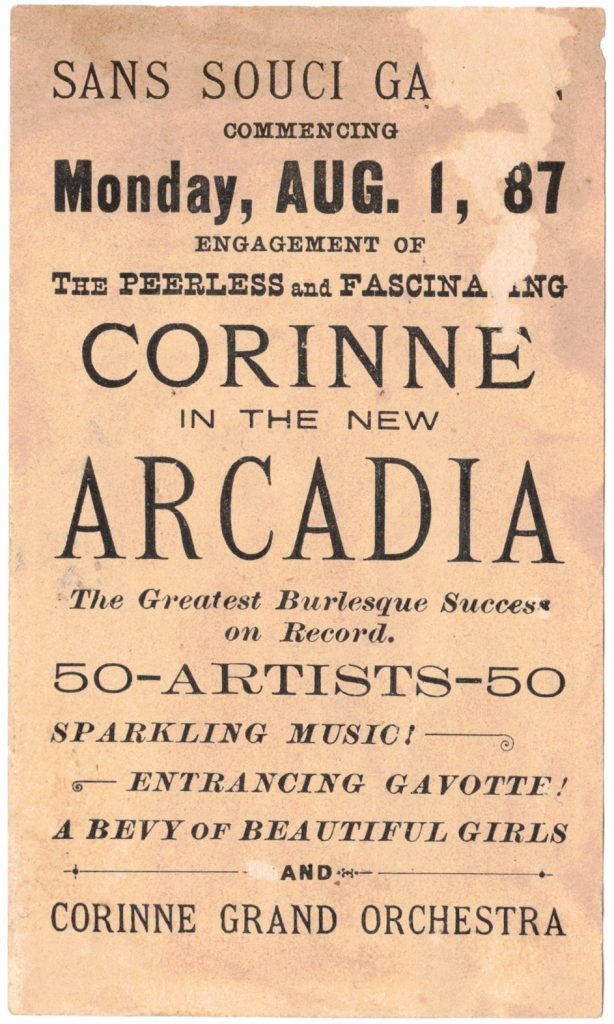
[IMAGE DESCRIPTION: A color illustration of a young woman in a large brown overcoat. Her hair is short, red, and curly. Her right hand pulls a knife from a pocket; she holds her left finger over her lips to “hush” the viewer. Text reads “Corinne in Arcadia”]
You know the story: a child performer exploited by her demanding and exploitative mother to perform all over the country. The grueling road life leaving little time for basic schooling and attracting the attention of child welfare agents. The drive to ever-greater heights of fame and fortune at the expense of a childhood.
No, not Gypsy Rose Lee. We’re talking about Corinne, the child star who rose to become one of the most famous performers in the United States before retiring from the stage before Gypsy Rose Lee was even born.
The Burlesque Hall of Fame recently acquired a late 19th century cigarette card featuring Corinne, promoting her star turn in “Arcadia” in 1887, when she was just 14 years old. At 14, Corinne was already a veteran of the stage, thanks to her foster mother and manager, the burlesque impresario Jennie Kimball.
Cigarette cards offer a unique insight into the popular culture of the late 19th and early 20th century. A precursor to the baseball and other collectible cards we’re familiar with today, they were originally included in paper cigarette packs to stiffen them and protect the cigarettes inside. The richly colored illustrations soon became desirable as collectibles, offering a way for manufacturers to distinguish their products and supplement their income with advertising revenue.
Since getting people to save and share these cards was the goal, tobacco companies featured people and topics that were appealing to their consumers – athletes, performers, new technologies like trains and cars, and of course, attractive women. Whoever saved this cigarette card in the 1880s kept it as a token of the fame of the young Corinne, much the same way teenagers might tape photos of their favorite musicians on their wall or keep a magazine with a favorite actor on the cover.
So who was Corinne? She was born in New Orleans in 1973. Her mother, a Spanish woman whose name hasn’t been preserved in the historical record, died shortly after her birth. Her father, a French naval officer, took her to Boston and left her in the care of his friend, actress Jennie Kimball, before returning to New Orleans and dying of yellow fever. Kimball, who had performed in productions such as Cinderella and The Black Crook, saw some talent in the toddler and entered her in a baby show, where her singing won her the top prize and the attention of theatrical producers. By age 5, Corinne made her debut as Little Buttercup in an all-child production of H.M.S. Pinafore at the Boston Museum, a show which ended up touring the country.

[IMAGE DESCRIPTION: Text only. A blemish obscures text in the upper right. Text reads “Sans Souci Ga (obscured) – Monday, Aug 1, 87 Engagement of The Peerless and Fascinating Corinne in the new Arcadia – The Greatest Burlesque Success on Record. 50-Artists-50 – Sparkling music! Entrancing Gavotte! A bevy of beautiful girls and Corinne Grand Orchestra.”]
Corinne’s success in H.M.S. Pinafore led Kimball to give up the stage to focus on managing her young charge’s career. At age 7, Corinne played the lead in Cinderella as her foster mother had before her; at age 8, she played the lead in Olivette. Around this time, the Society for the Prevention of Cruelty to Children in New York City sued for custody of Corinne, arguing that Jennie Kimball was exploiting the 8-year-old and neglecting her health and education. In court, it was shown that Corinne could neither read nor write and had no schooling other than an hour of instruction from Kimball every morning. Notably, they found that she’d never read the Bible nor been to church.
Kimball and her husband lost custody, but under the guise of taking Corinne home to pack, Kimball fled with Corinne to New Jersey and out of the court’s jurisdiction (she thought). The abduction was treated as a kidnapping, Kimball was caught, and her case was brought before another judge. In that trial, though, Kimball’s attorney was able to argue that the New York ruling was a violation of Kimball’s religious freedom, since so much had rested on Corinne’s lack of religious instruction. Witnesses testified to Kimball and her husband’s good character, and the judge reversed the custody order, leaving Corinne in Kimball’s custody for good.
When Corinne’s voice began to change at age 12, Kimball decided to use her only in less vocally demanding burlesque roles going forward, and created her Kimball Opera Company (sometimes called the Corinne Opera Company) as a platform for her young star. Corinne toured the country into the early 1890s, playing leads in burlesque plays including Arcadia (as featured on the cigarette card here) and Carmen, a very popular burlesque of the time. Her success was so great – and Kimball’s management so shrewd – that when her mother died in 1896 of pneumonia in her private railway car in St. Paul, MN, she left Corinne a fortune of $600,000 (almost $20 million in 2022 dollars).
Corinne continued to perform, working with Lee Shubert on Broadway, playing in London and elsewhere throughout Europe, and traveling the United States, but she never hit the height she had at 16 playing Carmencita in Carmen. An interview with her appears in a San Francisco paper in 1909, and there her story as a performer draws to a close. Wealthy beyond belief, unmarried (she tells the interviewer in 1909, “If my husband treated me the way I’ve seen some wives treated, I’m afraid I’d cut his heart out.”), and with no prospect of greatness on the stage ahead of her, Corinne retired from the stage in 1909. Intensely private, little is known about her life after that. She died in 1937.
